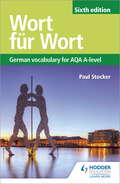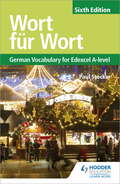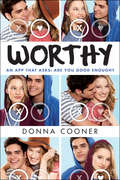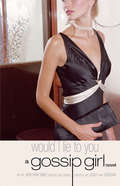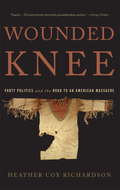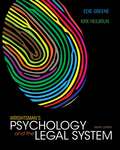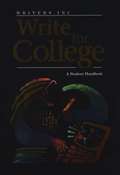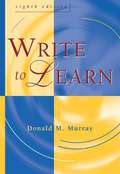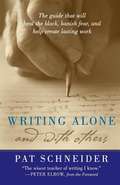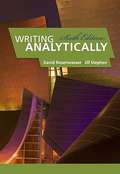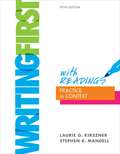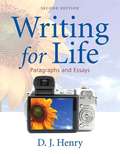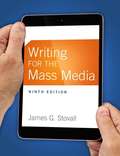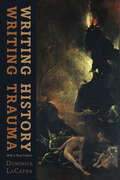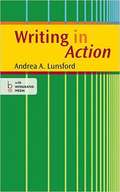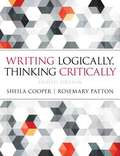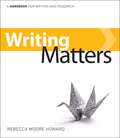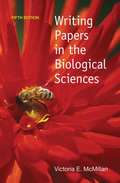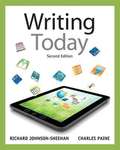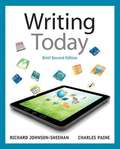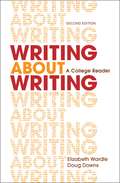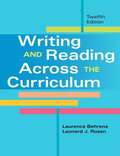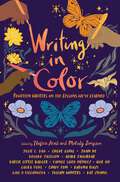- Table View
- List View
Wort für Wort Sixth Edition: German Vocabulary for AQA A-level
by Paul StockerExam board: AQALevel: A-levelSubject: GeographyFirst teaching: September 2016First exams: Summer 2018Essential vocabulary for AQA A-level German, all in one place.- Supplement key resources such as course textbooks with all the vocab students need to know in one easy-to-navigate place, completed updated to match the latest specification - Ensure extensive vocab coverage with topic-by-topic lists of key words and phrases, including a new section dedicated to film and literature - Test students' knowledge with end-of-topic activities designed to deepen their understanding of word patterns and relationships - Develop effective strategies for learning new vocab and dealing with unfamiliar words
Wort für Wort Sixth Edition: German Vocabulary for Edexcel A-level
by Paul StockerExam board: EdexcelLevel: A-levelSubject: GermanFirst teaching: September 2016First exams: Summer 2017Essential vocabulary for Edexcel A level German, all in one place.- Supplement key resources such as course textbooks with all the vocab students need to know in one easy-to-navigate place, completed updated to match the latest specification - Ensure extensive vocab coverage with topic-by-topic lists of key words and phrases, including a new section dedicated to film and literature - Test students' knowledge with end-of-topic activities designed to deepen their understanding of word patterns and relationships - Develop effective strategies for learning new vocab and dealing with unfamiliar words
Worthy
by Donna CoonerOnce again, Donna Cooner (Skinny, Can't Look Away) taps into the zeitgeist to bring us a searing story about the internet, superficiality, and the dangerous power of being anonymous online.Download the app. Be the judge.Everyone at Linden's high school is obsessed with Worthy. It's this new app that posts pictures of couples, and asks: Is the girl worthy of the guy? Suddenly, relationships implode as the votes climb and the comments get real ugly real fast. At first, Linden is focused on other things. Like cute Alex Rivera. Prom committee. Her writing. But soon she's intrigued by Worthy. Who's posting the pictures? Who's voting? And what will happen when the spotlight turns... on Linden?
Would I Lie to You: A Gossip Girl Novel (Gossip Girl #10)
by Cecily Von ZiegesarWelcome to New York City's Upper East Side where my friends and I live, and go to school, and play, and sleep - sometimes with each other.We all live in huge apartments with our own bedrooms and bathrooms and phone lines.We're smart, we've inherited classic good looks, we have fantastic clothes, and we know how to party... Continuing the #1 New York Times bestselling series about the provocative lives of New York City's most prestigious private school young adults. Sharp wit, intriguing characters, and high stakes melodrama drive the action of this addictive series that have made Gossip Girl the lit world's coveted "it" girl.
Wounded Knee: Party Politics and the Road to an American Massacre (Great Plains Photography Ser.)
by Heather Cox RichardsonOn December 29, 1890, American troops opened fire with howitzers on hundreds of unarmed Lakota Sioux men, women, and children near Wounded Knee Creek in South Dakota, killing nearly 300 Sioux. As acclaimed historian Heather Cox Richardson shows in Wounded Knee, the massacre grew out of a set of political forces all too familiar to us today: fierce partisanship, heated political rhetoric, and an irresponsible, profit-driven media. Richardson tells a dramatically new story about the Wounded Knee massacre, revealing that its origins lay not in the West but in the corridors of political power back East. Politicians in Washington, Democrat and Republican alike, sought to set the stage for mass murder by exploiting an age-old political tool-fear. Assiduously researched and beautifully written, Wounded Knee will be the definitive account of an epochal American tragedy.
Wrightsman's Psychology and the Legal System
by Edie Greene Kirk HeilbrunWRIGHTMAN'S PSYCHOLOGY AND THE LEGAL SYSTEM shows you the critical importance of psychology's concepts and methods to the functioning of many aspects of today's legal system. Featuring topics such as competence to stand trial, the insanity defense, expert forensic testimony, analysis of eye witness identification, criminal profiling, and many others, this best-selling book gives you a comprehensive overview of psychology's contributions to the legal system, and the many roles available to trained psychologists within the system.
Write for College: A Student Handbook
by Dave Kemper Patrick Sebranek Verne MeyerWrite for College emphasizes the kinds of writing most often asked for in college courses. But the handbook covers much more than writing. It also provides information and guidelines for speaking, thinking, test taking, studying, researching, and nearly every other topic essential to success in college.
Write to Learn (8th edition)
by Donald M. MurraySpeaking writer-to-writer to beginning and more experienced writers, Murray (University of New Hampshire) guides students through every step of the writing process, emphasizing that writing is a journey of discovery. In this eighth edition, there is new emphasis on learning to harvest ideas and connections before sitting down to write. There are new chapters on reviving a dead draft, and on Internet research. Individual, partner, and group activities are included.
Writing Alone and With Others
by Peter Elbow Pat SchneiderFor more than a quarter of a century, Pat Schneider has helped writers find and liberate their true voices. She has taught all kinds--the award winning, the struggling, and those who have been silenced by poverty and hardship. Her innovative methods have worked in classrooms from elementary to graduate level, in jail cells and public housing projects, in convents and seminaries, in youth at-risk programs, and with groups of the terminally ill. Now, in Writing Alone and with Others, Schneider's acclaimed methods are available in a single, well-organized, and highly readable volume. The first part of the book guides the reader through the perils of the solitary writing life: fear, writer's block, and the bad habits of the internal critic. In the second section, Schneider describes the Amherst Writers and Artists workshop method, widely used across the U. S. and abroad. Chapters on fiction and poetry address matters of technique and point to further resources, while more than a hundred writing exercises offer specific ways to jumpstart the blocked and stretch the rut-stuck. Schneider's innovative teaching method will refresh the experienced writer and encourage the beginner. Her book is the essential owner's manual for the writer's voice.
Writing America: Language And Composition In Context AP* Edition
by David A. Jolliffe Hephzibah RoskellyWe have designed Writing America: Language and Composition in Context AP* Edition so that it can be used as the foundational text in a course that emphasizes reading, writing, and analyzing texts. Writing America teaches reading as a dynamic, interactive process. It teaches writing as a craft, related to reading, that produces rich, purposeful, well-planned and well-executed texts. It teaches the structure and organization of texts, at the level of both the whole text and the sentence. It couches this instruction in an examination of vitally important works of American literature, art, and culture, accompanied by a study of contemporary pieces that unpack current thinking on the issues and themes raised by the historical works.
Writing Analytically (6th Edition)
by David Rosenwasser Jill StephenRosenwasser and Stephen (Muhlenberg College, Allentown, PA) show undergraduate students in first-year writing courses, as well as those in more advanced writing-intensive courses in various subjects, how to learn to analyze information and use writing to discover and develop ideas. They explain how to become more observant and push observations to implications and conclusions; use evidence, evolve claims, and converse with sources to write analytical papers; and understand organization, disciplinary formats, introductions and conclusions, and grammar and style. Writing exercises that can be applied to print and visual, text-based, and experiential materials are included, as are tips from professors on differences in disciplines other than English, rhetoric, or composition. This edition has a new introductory chapter previewing key topics, more examples, and more lists and rationales. It has two toolkit chapters on analytical methods instead of one, some reorganization and reformatting, more description of discipline-specific writing (especially the natural and social sciences), and new material in chapters on form. It has new sections on Rogerian argument, practical reasoning, and figurative logic, and expanded treatment of the four documentation styles. It clarifies step-by-step instructions, uncovering assumptions, and the method of looking for patterns of repetition and contrast. Another edition of the book includes readings. Annotation ©2012 Book News, Inc. , Portland, OR (booknews. com)
Writing First With Readings: Practice In Context
by Laurie G. Kirszner Stephen R. MandellBest-selling authors and veteran college writing instructors Laurie Kirszner and Stephen Mandell believe that students learn to write best when they use their own writing as a starting point. In Writing First with Readings: Practice in Context, designed for the paragraph to essay course, Kirszner and Mandell take seriously the ideas and expressive abilities of developmental students, as well as their need to learn the rules of writing and grammar. Visual writing prompts that open every chapter get students writing immediately. By moving frequently between their own writing, writing models and instruction, and workbook-style mastery exercises, students get constant reinforcement of the skills they are learning. Thoughtful chapters on college success, research, and critical reading, along with high-interest essays, round out the text, making it the perfect introduction to college writing.
Writing For Life (Second Edition)
by D. J. HenryD. J. Henry wrote Writing for Life from the ground up for today's college student. The ground-breaking approach of combining instruction and visual tools makes writing, reading and thinking processes visible, and shows the processes rather than just telling students about them. Highly graphic layouts and unique visual pedagogy empower students to transfer the learning strategies they already use in interpreting the visual world to the task of writing.
Writing For The Mass Media (Ninth Edition)
by James G. StovallA clear and effective introduction to media writing Writing for the Mass Media offers clear writing, simple organization, abundant exercises, and precise examples that give students information about media writing and opportunities to develop their skills as professional writers. With a focus on a converged style of media writing, and converting that style into real work, this ninth edition maintains its classic and effective text/workbook format while staying ahead of the curve and preparing students for their future careers. MyCommunicationLab is an integral part of the Stovall program. MediaShare allows students to post speeches and share them with classmates and instructors. Interactive videos provide students with the opportunity to watch and evaluate sample speeches. Online self-assessments and pre- and post-tests help students assess their comfort level with public speaking and their knowledge of the material.
Writing History, Writing Trauma (Parallax: Re-visions of Culture and Society)
by Dominick LaCapraAn updated edition of a major work in trauma studies.Trauma and its aftermath pose acute problems for historical representation and understanding. In Writing History, Writing Trauma, Dominick LaCapra critically analyzes attempts by theorists and literary critics to come to terms with trauma and with the crucial role post-traumatic testimonies—notably Holocaust testimonies—assume in thought and in writing. These attempts are addressed in a series of six interlocking essays that adapt psychoanalytic concepts to historical analysis, while employing sociocultural and political critique to elucidate trauma and its aftereffects in culture and in people. This updated edition includes a substantive new preface that reconsiders some of the issues raised in the book.
Writing In Action
by Andrea A. LunsfordAndrea Lunsford’s research treats student writers as writers first—not only in the classroom, but in every aspect of their lives. Her newest handbook features a simple and inviting design that helps students find solutions for every situation as they translate their skills as writers in their day-to-day lives to the conventions of solid academic writing. Featuring the writing process coverage of larger handbooks at a value price, Writing in Action is a supportive reference that emphasizes rhetorical strategies that help students put their ideas into action.
Writing Logically, Thinking Critically
by Sheila Cooper Rosemary PattonThis concise, accessible text teaches students how to write logical, cohesive arguments and how to evaluate the arguments of others. Integrating writing skills with critical thinking skills, this practical book teaches students to draw logical inferences, identify premises and conclusions and use language precisely. Students also learn how to identify fallacies and to distinguish between inductive and deductive reasoning. Ideal for any composition class that emphasizes argument, this text includes coverage of writing style and rhetoric, logic, literature, research and documentation.
Writing Matters: A Handbook for Writing and Research
by Rebecca Moore HowardWriting Matters unites research, reasoning, documentation, grammar and style in a cohesive whole, helping students see the conventions of writing as a network of responsibilities writers have.
Writing Papers in the Biological Sciences (Fifth Edition)
by Victoria E. McmillanWritten by a professional biologist who is also an experienced writing teacher, this comprehensive guide for students writing in biology, zoology, and botany provides detailed instruction on researching, drafting, revising, and documenting papers, reviews, poster presentations, and other forms of writing.
Writing Today
by Richard Johnson-Sheehan Charles PaineWith a clear and easy-to-read presentation, visual instruction and pedagogical support, Writing Today is a practical and useful guide to writing for college and beyond. This text teaches how to transfer their writing skills to careers. By teaching kinds of writing (analyses, reports, proposals, etc. ), strategies for writing (narration, comparison, argumentation, etc. ), and processes for writing (planning, drafting, revising, etc. ), Writing Today provides the writer with tools they can mix and match as needed to respond effectively to many writing situations.
Writing Today (Brief Edition)
by Richard Johnson-Sheehan Charles PaineWith a clear and easy-to-read presentation, visual instruction and pedagogical support, Writing Today is a practical and useful guide to writing for college and beyond. This text teaches how to transfer their writing skills to careers. By teaching kinds of writing (analyses, reports, proposals, etc. ), strategies for writing (narration, comparison, argumentation, etc. ), and processes for writing (planning, drafting, revising, etc. ), Writing Today provides the writer with tools they can mix and match as needed to respond effectively to many writing situations.
Writing Without Formulas
by William H. ThelinWriting Without Formulas shows students how to write instead of telling them. The first part focuses students on purposes for writing, critical analysis, audience awareness, organization of ideas, and language usage. In Part II, students learn about brainstorming and other activities associated with the writing process, investigate the best strategies for effective reading, see practical approaches to collaboration, and develop strategies for finding and using outside resources.
Writing about Writing: A College Reader 2nd Edition
by Elizabeth Wardle Doug DownsLiteracies : where do your ideas about reading and writing come from? -- Individual in community : how do texts mediate activities? -- Rhetoric : how is meaning constructed in context? -- Processes : how are texts composed? -- Multimodal composition : what counts as writing?
Writing and Reading Across the Curriculum (Twelfth Edition)
by Laurence Behrens Leonard J. RosenRemaining one of the best-selling interdisciplinary composition texts for over twenty-five years, Writing and Reading Across the Curriculum helps readers learn to write effectively for college.
Writing in Color: Fourteen Writers on the Lessons We've Learned
by Cindy Pon Kat Zhang Karuna Riazi Julie C. Dao Yamile Saied Méndez Laura Pohl Darcie Little Badger Adiba Jaigirdar Axie Oh Chloe Gong Kosoko Jackson Gail D. Villanueva Julian Winters Joan HeRethink the way you approach writing in this &“honest, useful craft book that all fledgling writers need&” (Kirkus Reviews, starred review) from fourteen diverse authors that demystifies craft and authorship based on their experiences as writers of color—perfect for fans of Fresh Ink and Our Stories, Our Voices.So, you&’re thinking of writing a book. Or, maybe you&’ve written one, and are wondering what to do with it. What does it take to publish a novel, or even a short story? If you&’re a writer of color, these questions might multiply; after all, there&’s a lot of writing advice out there, and it can be hard to know how much of it really applies to your own experiences. If any of this sounds like you, you&’re in the right place: this collection of essays, written exclusively by authors of color, is here to encourage and empower writers of all ages and backgrounds to find their voice as they put pen to page. Perhaps you&’re just getting started. Here you&’ll find a whole toolkit of advice from bestselling and award-winning authors for focusing on an idea, landing on a point of view, and learning which rules were meant to be broken. Or perhaps you have questions about everything beyond the first draft: what is it really like being a published author? These writers demystify the process, sharing personal stories as they forged their own path to publication, and specifically from their perspectives as author of color. Every writer has a different journey. Maybe yours has already started. Or maybe it begins right here. Contributors include: Julie C. Dao, Chloe Gong, Joan He, Kosoko Jackson, Adiba Jaigirdar, Darcie Little Badger, Yamile Saied Méndez, Axie Oh, Laura Pohl, Cindy Pon, Karuna Riazi, Gail D. Villanueva, Julian Winters, and Kat Zhang.
